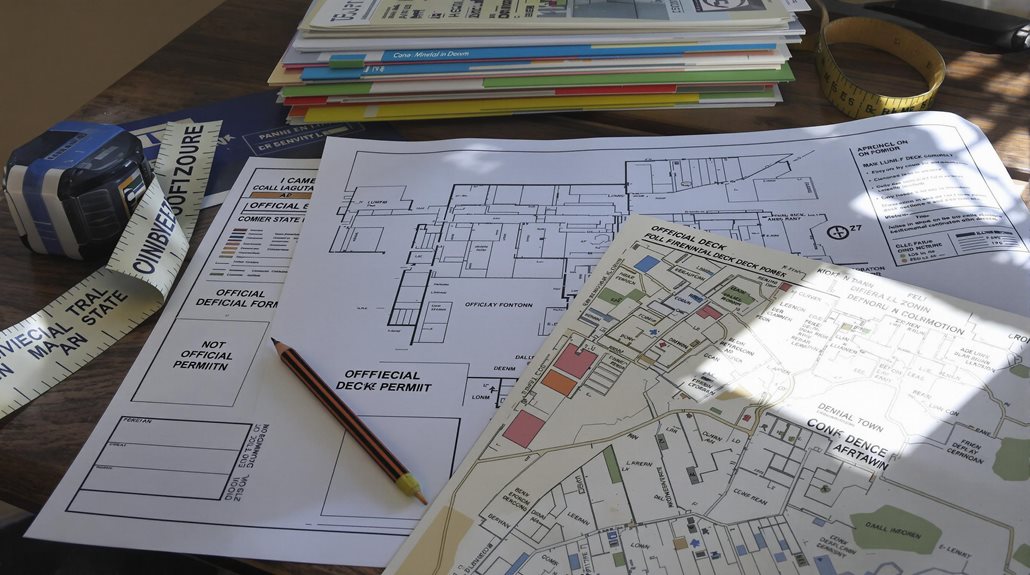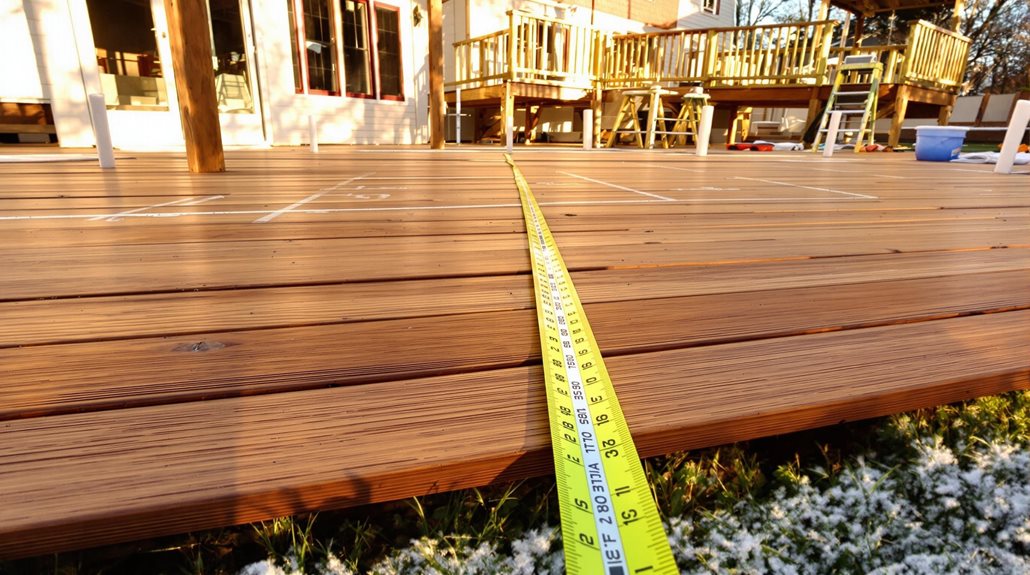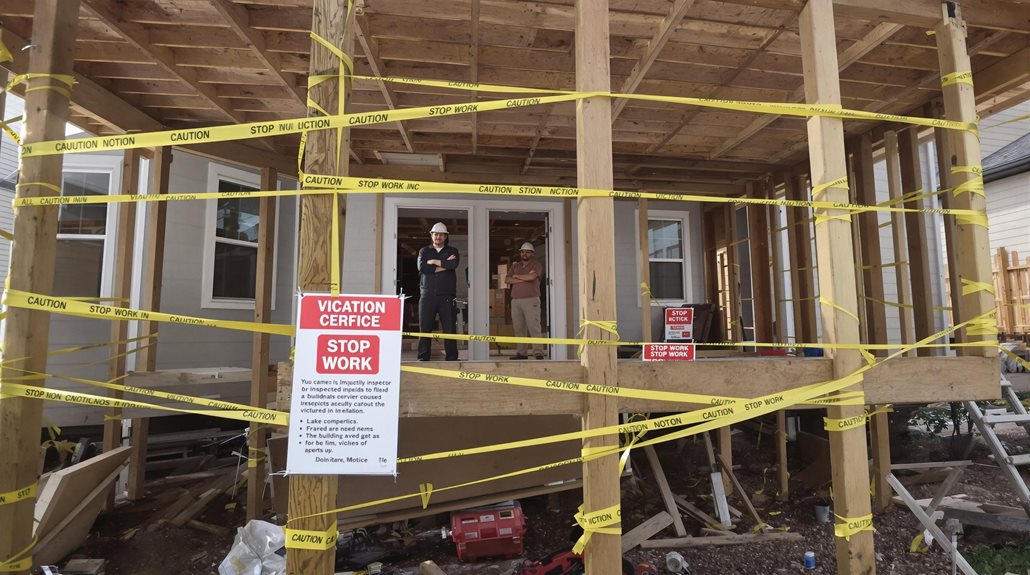Deck Building Permits and Zoning Laws: A State-by-State Guide
Building a deck requires careful consideration of local building codes, state-by-state permit requirements, and zoning laws to avoid fines and secure safety. Ignoring these regulations can lead to project delays, fines, and even legal action. For example, California mandates permits for decks over 30 inches high, while New York has specific safety standards for decks above 3 feet off the ground. Consulting local building departments and hiring experienced professionals can help navigate these complexities. By adhering to these rules, homeowners guarantee safety and compliance, avoiding costly penalties. Understanding these guidelines is vital for a successful deck construction project.
Expert Highlights
- Each state has unique regulations for deck construction, requiring specific permits and compliance with local building codes.
- California mandates a building permit for decks over 30 inches high, while New York requires safety standards for decks above 3 feet off the ground.
- Zoning laws dictate the distance of decks from property lines and structures, with non-compliance leading to fines or mandatory alterations.
- Multiple inspections during deck construction phases are usually required to ensure compliance with local building codes and zoning ordinances.
- Non-compliance can result in fines, legal action, or dismantling of the deck at the homeowner's expense, with appeal options available to dispute penalties.
Understanding Local Building Codes and Permits

When planning to build a deck, one of the first and most essential steps is understanding local building codes and permits. Ignoring these regulations can lead to costly fines, project delays, or even the necessity to dismantle the deck.
Local building codes vary greatly, addressing factors such as structural integrity, safety features, and environmental impact. For instance, some areas may require specific types of materials or designs to withstand local weather conditions.
To navigate these complexities, homeowners should consult their local government's building department. They can provide detailed information on necessary permits and compliance requirements.
Obtaining the right permits guarantees that the deck is built safely and legally, protecting both the homeowner and their neighbors. By adhering to these codes, homeowners can avoid potential legal issues and ensure their deck is a safe and enduring addition to their property.
Working with experienced professionals who focus on custom solutions can help ensure your deck project meets all local building requirements while maintaining aesthetic appeal.
State-by-State Permit Requirements
Building a deck involves more than just selecting the right materials and designing the perfect layout; it also requires maneuvering a complex web of state-by-state permit requirements.
Each state has its own set of regulations, which can be overwhelming for homeowners. For instance, in California, decks over 30 inches above the ground require a building permit, while in New York, any deck that is more than 3 feet off the ground must comply with specific safety standards.
To navigate these requirements successfully, homeowners should start by contacting their local building department to understand the specific regulations in their area.
Obtaining the necessary permits guarantees compliance with safety standards and avoids potential fines or even the need to dismantle the deck.
Working with expert deck contractors ensures proper compliance with local building codes while maintaining seamless integration with your home's architecture.
Zoning Laws and Setback Regulations

Zoning laws and setback regulations present another critical layer of complexity for homeowners aiming to build a deck.
These laws dictate how close a deck can be to property lines, neighboring buildings, and other structural elements. Non-compliance can result in fines, mandatory alterations, or even the removal of the deck.
To navigate these regulations, homeowners should consult their local zoning ordinances before starting the project. They can visit their city or county planning department to obtain specific details about required setbacks and any special permits needed.
Working with professionals who create 3D deck designs can help ensure your planned structure complies with local zoning requirements while meeting your outdoor living needs.
Inspection Processes and Compliance
How do homeowners guarantee that their newly constructed deck complies with local building codes and regulations? The key lies in understanding and maneuvering the inspection processes and compliance requirements.
Homeowners often face the challenge of confirming their deck meets all safety and structural standards, which can be intimidating without proper guidance. To address this, most local authorities require multiple inspections at various stages of deck construction, such as during the footing, framing, and final completion phases.
Homeowners must schedule these inspections with their local building department and validate all necessary documentation is in order. Compliance with these regulations not only avoids costly fines and potential dismantling of the deck but also secures the safety of those using it.
Working with licensed deck professionals ensures compliance with the latest building codes while maintaining the highest standards of safety and craftsmanship throughout the construction process.
Penalties for Non-Compliance and Appeal Processes

Non-compliance with local building codes and regulations can lead to significant penalties for homeowners, emphasizing the importance of adherence to these standards. Failing to obtain the necessary permits or violating zoning laws can result in fines, legal action, and even the requirement to dismantle the deck. Working with a team that focuses on building code compliance helps ensure proper construction standards from the start.
| Penalty Type | Description |
|---|---|
| Fines | Monetary penalties that can range from a few hundred to several thousand dollars. |
| Legal Action | Homeowners may face lawsuits or court orders to correct violations. |
| Dismantling | In severe cases, the deck may need to be dismantled at the homeowner's expense. |
To avoid these penalties, homeowners should guarantee they comply with all local regulations. If a penalty is imposed, there are appeal processes available. Homeowners can submit an appeal to the local building authority or zoning board, providing evidence that the violation was unintentional or that compliance was achieved after the fact. This proactive approach can help mitigate penalties and resolve issues amicably.
Frequently Asked Questions
Can I Build a Deck Without a Permit if It's Very Small?
Building a small deck without a permit may be possible, but it depends on local regulations. Check with your local building department to determine if your project meets the criteria for permit exemptions. Regulations vary by location.
How Long Does It Typically Take to Get a Deck Building Permit Approved?
The approval time for a deck building permit typically ranges from a few days to several weeks, depending on the complexity of the project and the efficiency of the local building department. Factors such as the size of the deck, design complexity, and workload of the permitting office can influence the duration. Generally, simpler projects are approved faster than more complex ones.
Are There Specific Materials Required for Deck Construction in Certain States?
Certain states mandate specific materials for deck construction to guarantee safety and compliance with local building codes. For example, some states require pressure-treated lumber for deck framing, while others specify certain types of decking boards.
Can I Appeal a Denied Deck Building Permit, and How?
Yes, one can appeal a denied deck building permit. The process typically involves submitting a formal appeal to the local zoning or building department, providing additional information or corrections, and potentially attending a hearing to present the case.
Do I Need to Hire a Professional to Apply for the Permit?
Hiring a professional to apply for a deck building permit is not always necessary, but it can be beneficial if the homeowner is unfamiliar with local regulations or the application process. Professionals can guarantee compliance and streamline the process.
Expert Final Thougts
Building a deck involves more than just hammering nails; it requires traversing complex local building codes, permit requirements, and zoning laws. Each state has its own set of regulations, and non-compliance can lead to costly penalties and legal issues. By understanding these rules and following the proper inspection processes, homeowners can guarantee their deck is safe, compliant, and enhances their property value. Taking the time to research and adhere to these guidelines is essential for a successful and stress-free project.




